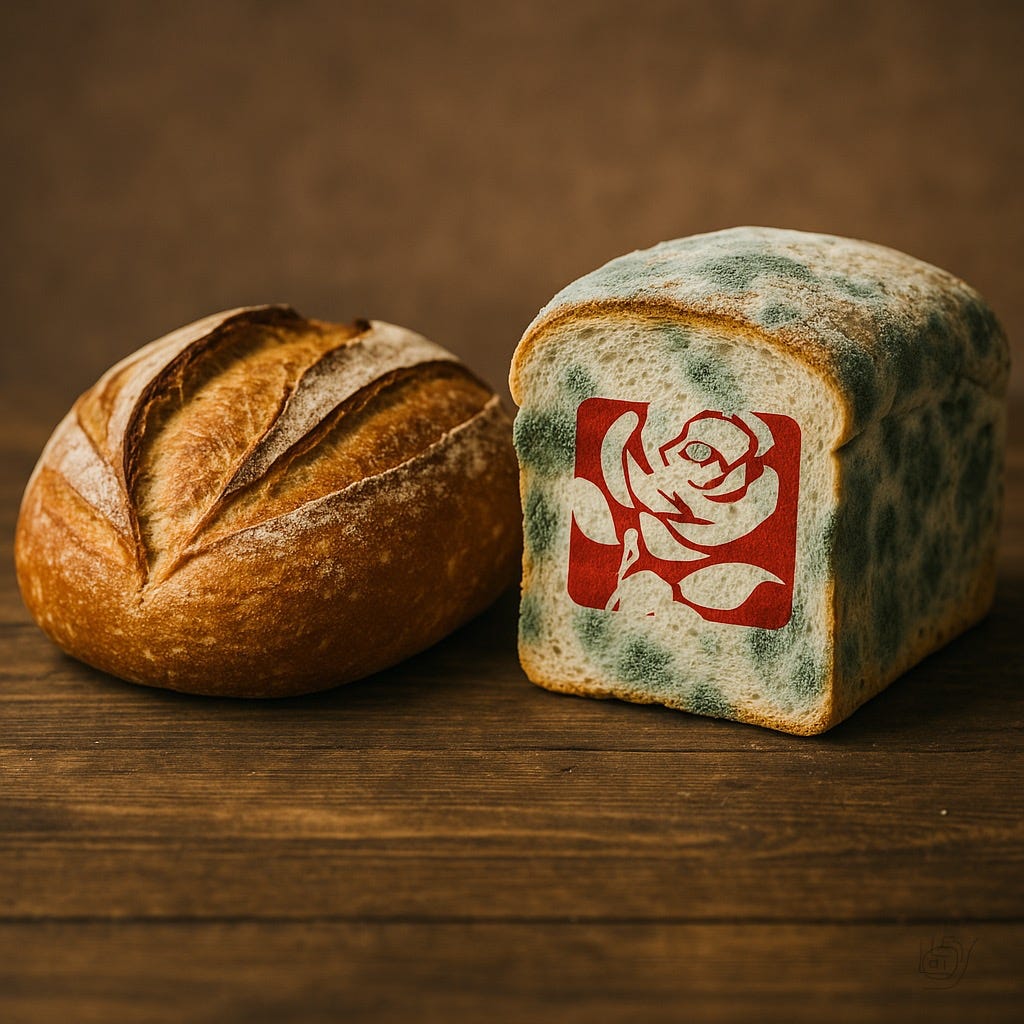The Virtue Gap: Why the Baker Rises and Starmer Sinks
If Labour wants to rise, it might start by learning from the baker. Warmth, simplicity and no lectures.
There was a time when bread was something you ate because life was grim. You did not choose it, you endured it. It was what kept you going through a shift at the GEC or a long trudge down Broad Street before the trams, the flat whites and the fancy bars took over.
In Birmingham, we built an empire on white sliced. The old Co-op bakery up Nechells way turned out loaves by the thousand, soft, square and cheaper than chips. They fed half the Midlands and filled the air with that warm, ghostly smell of comfort and compromise. You could buy a week’s worth for less than a pint.
Now the same city sells five-quid sourdoughs made by blokes called Barnaby in linen aprons who talk about fermentation like it is a religion. The bread’s got a better backstory than most politicians. Slow rise, local grains, organic yeast and no moral additives.
Once upon a time, the poor broke bread. Now the rich break Instagram feeds with it. We have gone from “please sir, may I have some more?” to “please sir, is it stone-ground, naturally leavened and certified by a miller from Moseley with an oat allergy?”
It is not bread anymore. It is self-expression. It is a lifestyle, a moral declaration, a ticket to the Church of Saint Gluten-Free.
And yet, while the baker gets rich selling virtue by the slice, poor old Keir Starmer cannot give the stuff away. The baker’s queue curls round the block like it is Glastonbury tickets. Starmer’s stops somewhere near Stoke.
Bread without the sermon
That is because the baker never lectures you. They do not ask if your oven runs on renewables or if your toaster is carbon neutral. They just hand you a warm loaf and let you feel virtuous.
You get your moral glow with a chewy crust, not a policy leaflet.
Labour, on the other hand, loves a checklist.
Do you drive? Do you eat meat? Do you clap nurses in the correct rhythm? Do you reject the outcome of the Brexit referendum?
The baker smiles and takes your fiver.
Labour frowns and takes your joy.
The politics of aspiration and accusation
Bread has always been about class. The white loaf was once a symbol of status. Now the artisan brown is. The baker’s genius is to make aspiration edible. You can buy middle-class respectability for £4.75, cheaper than a therapist and twice as comforting.
Labour used to sell identity. We are you. These days it sells aspiration. Become us. That is not an easy pitch in a country where most people are working harder than ever just to stand still.
The baker lets you taste the middle class. Starmer wants you to qualify for it.
Authenticity inflation
Here is the irony. The baker’s authenticity rises while Labour’s goes flat. People believe the baker because they can see the flour on their apron. Starmer’s Labour looks like it has been proofed in a policy lab, sterile, managed and crustless.
The artisan bakery has replaced the old working men’s club as the moral meeting place. It is where the middle classes gather to feel real, while Labour’s authenticity has been wrapped, sliced and sealed in plastic.
Virtue that flatters, not lectures
Bread is the perfect modern virtue. It is visible, tasty and guilt-free. You walk home with your loaf and feel like you have done something good for yourself, your planet and your conscience.
Politics does not offer that. Starmer’s moral tone is managerial virtue, worthy but weary. It is the difference between a warm loaf and a cold spreadsheet.
The baker makes you feel better about yourself. Starmer too often makes you feel worse. And nobody queues for guilt.
The new class code
Britain’s class divide now runs through its bread baskets.
The poor buy sliced white and get told it is bad for them.
The rich buy heritage spelt and call it sustainable.
Everyone else buys Warburtons and gets on with life.
The baker profits because their virtue is consumable. Starmer struggles because his virtue is conditional. You can buy the five-quid loaf with no questions asked, but try voting Labour and you will get a side order of self-examination.
Do you drive? Do you eat meat? Do you clap nurses in the correct rhythm? Do you reject the outcome of the Brexit referendum?
The baker is happy with your fiver. Labour wants your confession.
Virtue and volume
The artisan baker whispers morality through texture and scent. Starmer delivers it in bullet points. It is the difference between a baker’s warm smile and a PowerPoint on productivity.
One makes you feel human. The other makes you feel audited.
The real yeast of it
Virtue, it turns out, is a lot like yeast. Handle it gently and it makes things rise. Handle it too firmly and the whole thing collapses.
The baker’s touch is light. Starmer’s is heavy.
And that, right there, is the virtue gap.
The closing crust
Maybe that is the moral of modern Britain. People will pay five pounds for a loaf that makes them feel good, but they will not give five minutes to a politician who makes them feel bad.
The baker wins hearts because they never try to win arguments.
Starmer, bless him, is still proving. The baker’s bread has already risen.
GRIT Comment
There is a deep truth baked into this crusty cultural moment. Virtue is the new currency, but it only circulates when it flatters, not when it scolds. If Labour wants to rise, it might start by learning from the baker. Warmth, simplicity and no lectures.
Just hand people something that smells good and feels honest.
That is all most of Britain ever wanted.




Starmer wants you to qualify for middle class so Rachel can rob you